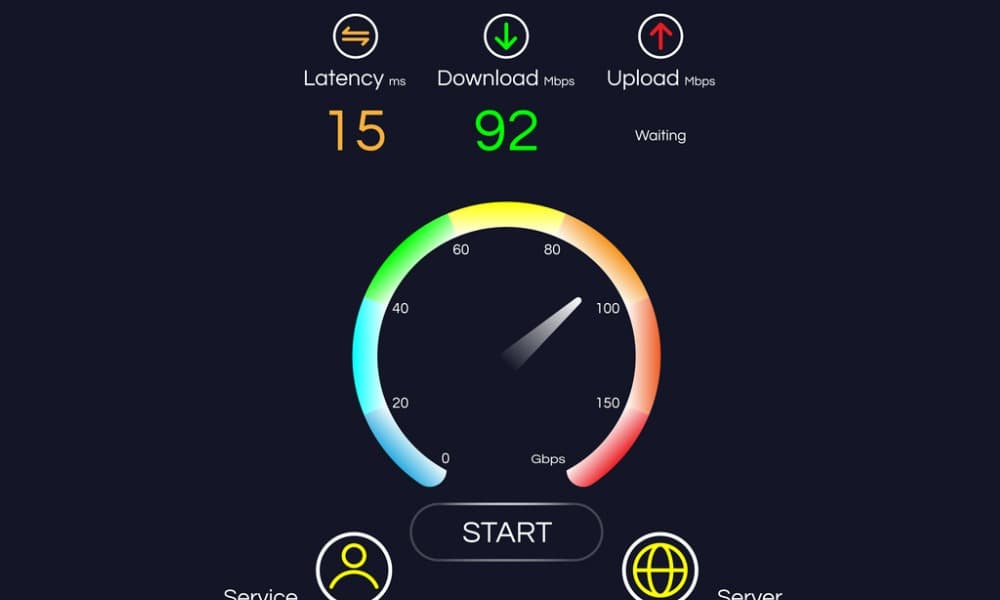
Blog
Online tests can slow down your network and yield inaccurate results
Key takeaways:
- Online speed tests don’t provide the information you really need.
- Running a long test can significantly slow down network traffic.
- A throughput test shows a much lower rate but provides accurate information to maintain productivity and efficiency.
Business today moves fast, and your internet connection has to keep up. You might use online speed tests that show you’re getting the maximum throughput, but a 7SIGNAL throughput test shows a much lower rate. Why?
In a recent webinar, Site Speed Tests VS. 7SIGNAL Throughput Tests, Mike Graham, Senior Systems Engineer, discussed the mechanics of popular online testing sites and why the underlying TCP protocol affects the results, why testing time makes a difference, and how a 7SIGNAL throughput tests gives you accurate, necessary information to maintain productivity and efficiency.
How online speed tests work
Online speed tests do what they can to improve throughput to give you a deceptively high number. These tests:
- Run multiple connections and add the values together – some use as many as eight simultaneous connections
- Adjust buffer sizes and data requests and send to maximize throughput
- Often simple measure performance from your device to your ISP’s data center
- Run long tests that disrupt network performance
Online speed tests don’t run a single connection, and they add the values together.
Speedtest runs 4, and the test usually runs for 15 seconds. Multiple connections adjust buffer sizes and data requests and send during the test to maximize the throughput. They aim to use enough data to flood the internet connection and measure the full capacity.
Fast.com by Netflix uses up to 8 simultaneous connections during the download and runs for up to 30 seconds. It uses the Netflix CDN. They attempt to report the fastest speed (not the start of the test).
This data is useful for a point-in-time measurement of maximum network capability to detect a significant slowdown but not for a true speed test. In fact, some of these tests will indicate a speed exceeding the maximum for your connection.
This type of testing does a good job of simulating large file or torrent downloads but a poor job of simulating web browsing and email. Another factor is the impact on the network being tested due to test length.
Test length and network impact
Online speed tests operate using TCP and, for congestion control, require a slow start: If you’re missing ACKs (the acknowledgment sent back to the transmitter when the bites or packets are received), the number of bites or packets in flight is reduced. Nothing more is sent until the ACKs return, and transmissions can be increased again. The number of packets allowed in flight continually increases until the maximum is reached or the ACK is not received.
Thirty seconds is a long test, especially when multiple people in your office are testing their speed. It can significantly slow down network traffic. Usually, one person does a speed test, encourages a colleague to do so, and soon everyone tests their connection, and everything is slowed down. This results in productivity loss.
The 7SIGNAL HTTP download throughput test
The 7SIGNAL HTTP download throughput test is designed to have minimal network impact. While it doesn’t simulate large file downloads well, unlike online speed tests, it gives you a fuller picture in less time. 7SIGNAL’s test only runs on a single stream for two seconds to minimize network impact.
The 7SIGNAL throughput test:
- Uses a single download stream
- Runs for only two seconds
- Simulates web browsing, emails, and small file downloads
.png?width=515&height=350&name=image3%20(9).png)
The goal of the download throughput test isn’t to artificially inflate speed. It measures what your company’s internet or network traffic actually looks like. You want to make consistent measurements over time without affecting the network.
Give 7SIGNAL a try
7SIGNAL is a leader in Enterprise Wi-Fi optimization. Founded by wireless networking pioneers, we deliver applications that continuously monitor the stability of our clients’ Wi-Fi networks to mitigate risk.
We supply Wi-Fi connectivity solutions that improve efficiency and productivity, paired with unparalleled visibility and insight into end-user digital experiences. This allows tech teams to solve challenges, save time, and deliver value.
The 7SIGNAL platform is designed for the world’s most innovative organizations, educational institutions, hospitals, and government agencies and is currently deployed at IBM, Kaiser Permanente, Nike, and other Fortune 500 companies. 7SIGNAL continuously monitors the connectivity of an estimated 20 million global devices. Learn more at www.7signal.com and request your free trial.